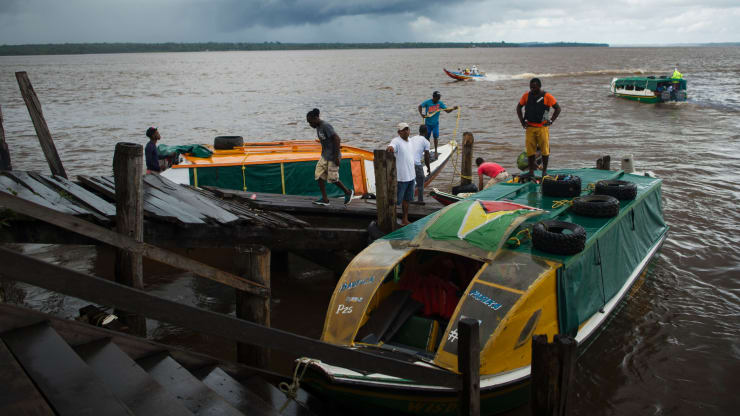An upcoming election in one of the smallest and poorest countries in South America is set to decide on a new government to oversee the highest amount of oil per person of any country in the world.

Guyana, a country of about 750,000 which shares a border with Brazil, Suriname and Venezuela in the northeast of South America, will hold a general election on Monday.
“It looks like the excitement stems from two areas — the size of Guyana’s reserves and what that means for the economy, as well as the timing/optics of developing a major new oil project just as global attention turns to the climate crisis,” Cailin Birch, global economist at the Economist Intelligence Unit (EIU), told CNBC via email.
The Fund believes real annualized GDP (gross domestic product) in Guyana will balloon almost 86% in 2020. That’s up from 4.4% last year. To be sure, the IMF’s estimated rate of economic growth in Guyana is 40 times that of what is expected from the U.S. — the world’s largest economy.
Analysts have told CNBC that the reason Guyana can expect to record such an explosive rate of economic expansion stems from the fact it has just become Latin America’s newest crude-producing nation.
“Guyana is the new frontier of oil,” Diego Moya-Ocampos, principal political analyst for Latin America at IHS Markit, told CNBC via telephone.
“That’s a lot of oil,” Moya-Ocampos said.
‘Dutch disease’
Late last month, Exxon Mobil estimated that total recoverable oil and gas resources in Guyana had climbed to more than 8 billion barrels.
The extraordinary announcement follows more than a dozen discoveries of offshore oil in the country in recent years.
Exxon said it anticipated production from Guyana’s Liza Phase 1 development would produce up to 120,000 barrels per day in the coming months.
But, while many expect Guyana’s long-awaited debut as an oil exporter to radically transform the country’s social and economic development, some have expressed concern about the risks associated with such a sudden inrush of revenues.
“Is it wise for Guyana to commit its economic growth outlook to the oil industry, just as prices are falling on weak demand and the global economy is on the cusp of an energy transition?” the EIU’s Birch said.
“If Guyana becomes reliant [or over reliant on oil revenue and the market does indeed reach ‘peak oil’ by 2030, as many expect, this could expose the country to a sharp downturn that would be difficult to recover from,” Birch added.
IHS Markit has forecast Guyana to record economic growth of around 30% this year, with foreign investment and government revenues likely to mean the country enjoys a substantial boost.
When asked why the research firm’s forecast for economic growth in Guyana was so much lower than the IMF’s, Moya-Ocampos replied: “There are a lot of question marks still about how the Guyanese are going to be able to manage such extraordinary flows of revenue coming into the country.”
“Like all oil-exporting countries, the huge influx in wealth creates the risk of inflation, currency appreciation, Dutch disease, and corruption — not to mention environmental damage.”
What is the significance of Guyana’s election?
Guyanese voters will head to the ballot box on Monday, with President David Granger’s ruling A Partnership for National Unity-Alliance for Change (APNU-AFC) coalition and Irfaan Ali’s opposition Indo-Guyanese People’s Progressive Party-Civic (PPP-C) thought to be the main contenders.
Analysts have told CNBC that the eventual winner is only likely to win by a wafer-thin margin.
“If the PPP–C wins the election, it is likely to renegotiate contracts in the construction sector, targeting infrastructure projects being undertaken by companies perceived as close to the APNU–AFC coalition,” IHS’ Moya-Ocampos said.
“In the oil sector, ExxonMobil’s production-sharing agreement contract is highly unlikely to be renegotiated. Nevertheless, Ali warned in January that oil contracts signed after 2016,” he added.
[contextly_sidebar id=”UIZf93DSSckUGikp42WFP7TxZzdAgyuR”]







